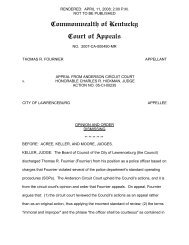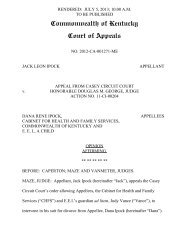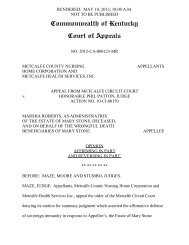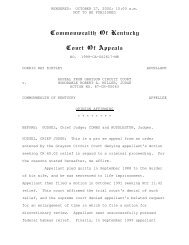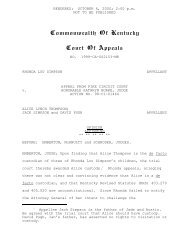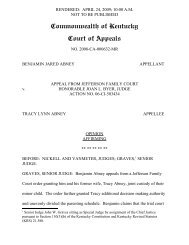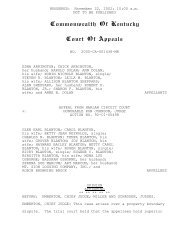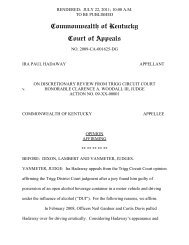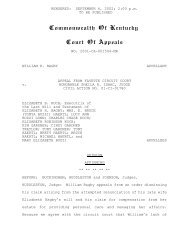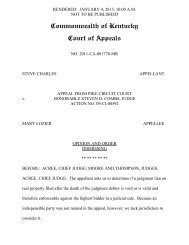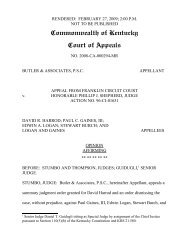2011-CA-002132 - Kentucky Supreme Court Searchable Opinions
2011-CA-002132 - Kentucky Supreme Court Searchable Opinions
2011-CA-002132 - Kentucky Supreme Court Searchable Opinions
Create successful ePaper yourself
Turn your PDF publications into a flip-book with our unique Google optimized e-Paper software.
RENDERED: MARCH 8, 2013; 10:00 A.M.<br />
NOT TO BE PUBLISHED<br />
Commonwealth of <strong>Kentucky</strong><br />
<strong>Court</strong> of Appeals<br />
NO. <strong>2011</strong>-<strong>CA</strong>-<strong>002132</strong>-MR<br />
MICHAEL SHELIGA APPELLANT<br />
APPEAL FROM ROCK<strong>CA</strong>STLE CIRCUIT COURT<br />
v. HONORABLE JEFFREY T. BURDETTE, JUDGE<br />
ACTION NO. 11-CI-00189<br />
BILLY TODD; VERNA TODD;<br />
AND JAMIE TODD APPELLEES<br />
OPINION<br />
AFFIRMING<br />
** ** ** ** **<br />
BEFORE: COMBS, KELLER AND MAZE, JUDGES.<br />
KELLER, JUDGE: Michael Sheliga (Sheliga) appeals from an order of the<br />
Rockcastle Circuit <strong>Court</strong> dismissing all of his claims against Billy Todd (Billy),<br />
Verna Todd (Verna), and Jamie Todd (Jamie) (collectively the Appellees), with the<br />
exception of his claim of assault. For the following reasons, we affirm.
FACTS<br />
Sheliga filed a Complaint and an amended Complaint (collectively the<br />
Complaint) in the Rockcastle Circuit <strong>Court</strong> against the Appellees asserting:<br />
terroristic threatening and menacing; destruction of evidence; defamation;<br />
violations of <strong>Kentucky</strong> Revised Statute (KRS) 258.235; negligence; intentional<br />
infliction of emotional distress; and assault. In his Complaint, Sheliga alleged the<br />
following.<br />
On May 25, <strong>2011</strong>, the Appellees’ dog chased Sheliga on a road while<br />
he was riding his bike nearly causing him to wreck into a car, a ditch, or the<br />
pavement. Sheliga further alleged that the dog chased him again and that he yelled<br />
at it to keep it away. Billy, who was standing in his front yard, screamed at<br />
Sheliga for yelling at his dog and told him that, “I’ll blow your head off.” Billy<br />
continued to yell at Sheliga, and Sheliga told Billy repeatedly that he would not<br />
yell at the Appellees’ dog so long as they kept it off the road.<br />
Sheliga left and, shortly thereafter, a truck came behind him and cut<br />
him off requiring him to stop. Billy was driving the truck and Jamie was in the<br />
passenger seat. Billy then continued to yell at Sheliga, and Sheliga told Billy that<br />
if he kept his dog off the road he would not say anything to the dog. After Sheliga<br />
rode away, Billy drove to a nearby store, got out of the truck, and stood on the road<br />
in order to fight Sheliga. Sheliga then went to the nearest house and asked to call<br />
the sheriff. Billy, Jamie, and Verna provided written statements to the police<br />
-2-
providing their versions of what occurred on May 25, <strong>2011</strong>, which Sheliga<br />
attached to his Complaint.<br />
On August 8, <strong>2011</strong>, the Appellees filed a motion to dismiss Sheliga’s<br />
Complaint pursuant to <strong>Kentucky</strong> Rule of Civil Procedure (CR) 12.02(f) for failure<br />
to state a claim upon which relief may be granted, and the trial court held a<br />
hearing. In an order entered on October 26, <strong>2011</strong>, the trial court granted the<br />
Appellees’ motion to dismiss as to all claims except for assault.<br />
below.<br />
This appeal followed. Additional facts are set forth as necessary<br />
STANDARD OF REVIEW<br />
Sheliga appeals from an order rendered pursuant to a motion to dismiss for<br />
failure to state a claim upon which relief may be granted. The motion to dismiss<br />
and the response refer to matters outside of the pleadings. “As such, the motion<br />
will be treated as a motion for summary judgment.” Bear, Inc. v. Smith, 303<br />
S.W.3d 137, 141-42 (Ky. App. 2010).<br />
As stated in Smith:<br />
[W]hen considering a motion for summary judgment, the<br />
court is to view the record in the light most favorable to<br />
the party opposing the motion, and all doubts are to be<br />
resolved in that party’s favor. The trial court must<br />
examine the evidence, not to decide any issue of fact, but<br />
to discover if a real issue of material fact exists. The<br />
moving party bears the initial burden of showing that no<br />
issue of material fact exists, and then the burden shifts to<br />
the party opposing summary judgment to present at least<br />
some affirmative evidence showing that there is a<br />
genuine issue of material fact for trial.<br />
-3-
Id. (citations omitted). Further, “[a]n appellate court need not defer to the trial<br />
court’s decision on summary judgment and will review the issue de novo because<br />
only legal questions and no factual findings are involved.” Hallahan v. The<br />
Courier-Journal, 138 S.W.3d 699, 705 (Ky. App. 2004).<br />
ANALYSIS<br />
At the outset, we note that Sheliga only appeals from the trial court’s<br />
dismissal of the following claims: defamation; negligence per se; intentional<br />
infliction of emotional distress (IIED); negligence; and violations of KRS 258.235.<br />
Therefore, we only address those claims.<br />
1. Defamation<br />
Sheliga argues that the trial court erred in dismissing his defamation<br />
claim. Specifically, he argues that false statements that Billy, Verna, and Jamie<br />
made in written reports to Sheriff Mike Peters (Sheriff Peters), and statements they<br />
made to the County Attorney, William Reynolds (Reynolds), and members of<br />
Reynolds’s office defamed him.<br />
To establish defamation, a plaintiff must show: (1) defamatory language, (2)<br />
about the plaintiff, (3) which is published, and (4) which causes injury to<br />
reputation. Columbia Sussex Corp., Inc. v. Hay, 627 S.W.2d 270, 273 (Ky. App.<br />
1981). Regarding the first element, a writing is defamatory if it tends to bring a<br />
person into public hatred, contempt or ridicule, causes the person to be shunned or<br />
avoided, or injures the person’s business or occupation. McCall v. Courier-<br />
-4-
Journal & Louisville Times Co., 623 S.W.2d 882, 884 (Ky. 1981). More<br />
specifically, “a written publication is [defamatory] which falsely charges or<br />
imputes dishonesty or engagement in fraudulent enterprises of such a nature as<br />
reflects upon the character and integrity of a person and to subject him to the loss<br />
of public confidence and respect.” Yancey v. Hamilton, 786 S.W.2d 854, 858 (Ky.<br />
1989) (quoting Smith v. Pure Oil Co., 278 Ky. 430,128 S.W.2d 931, 932 (1939)).<br />
As for the third element, the term “‘publication’ is a term of art, and defamatory<br />
language is ‘published’ when it is intentionally or negligently communicated to<br />
someone other than the party defamed.” Stringer v. Wal-Mart Stores, Inc., 151<br />
S.W.3d 781, 794 (Ky. 2004).<br />
Finally, the “proof necessary to demonstrate an injury to reputation varies<br />
depending upon the characterization of the defamatory language . . . .”<br />
Defamatory language may be actionable per se or per quod. “In the former class,<br />
damages are presumed and the person defamed may recover without allegation or<br />
proof of special damages.” Id. In the latter class, recovery may be sustained only<br />
upon an allegation and proof of “special damages, i.e., actual injury to reputation.”<br />
Id. at 795.<br />
Statements that are considered defamatory per se include “those which<br />
attribute to someone a criminal offense, a loathsome disease, serious sexual<br />
misconduct, or conduct which is incompatible with his business, trade, profession,<br />
or office.” Gilliam v. Pikeville United Methodist Hosp. of Ky., Inc., 215 S.W.3d<br />
-5-
56, 61 (Ky. App. 2006). All other defamatory statements are merely defamatory<br />
per quod. Stringer, 151 S.W.3d at 795.<br />
In this case, Sheliga complains of statements Billy, Verna, and Jamie made<br />
in their written reports to Sheriff Peters. In their reports, the Appellees stated that<br />
Sheliga was on their driveway and was cursing and screaming about their dog.<br />
Because the Appellees’ statements do not attribute to Sheliga “a criminal offense, a<br />
loathsome disease, serious sexual misconduct, or conduct which is incompatible<br />
with his business, trade, profession, or office,” their statements are not defamatory<br />
per se.<br />
As set forth in Rich for Rich v. <strong>Kentucky</strong> Country Day, Inc., 793 S.W.2d<br />
832, 837 (Ky. App. 1990):<br />
In a defamation action based upon slander per quod, as<br />
here, the plaintiff must in his Complaint, allege specific<br />
damages resulting from the statements made, other than<br />
just mental pain, humiliation, disgrace or mortification.<br />
If plaintiff fails to allege facts which would show specific<br />
damages, and plaintiff’s prayer is for general damages<br />
only, the Complaint does not state a cause of action for<br />
slander per quod.<br />
In this case, Sheliga’s Complaint only seeks general damages, and he does<br />
not allege special damages. Thus, the Complaint does not state a cause of action<br />
for defamation per quod.<br />
Furthermore, we note that, in his Complaint, Sheliga alleges that the<br />
Appellees made statements to Reynolds and members of his office, but does not<br />
describe the nature of those statements. In his response to the Appellees’ motion<br />
-6-
for summary judgment, 1 Sheliga alleged that the Appellees made statements that he<br />
“engaged in criminal conduct.” However, Sheliga does not further describe the<br />
statements the Appellees allegedly made.<br />
As the party opposing the Appellees’ motion for summary judgment,<br />
Sheliga was required to present some affirmative evidence to support his claim.<br />
See Steelvest, Inc. v. Scansteel Service Center, Inc., 807 S.W.2d 476, 481 (Ky.<br />
1991). Sheliga has not presented any evidence, other than his self-serving<br />
statements, that the Appellees defamed him. Accordingly, the trial court properly<br />
granted summary judgment in favor of the Appellees as to Sheliga’s defamation<br />
claim.<br />
1 As previously noted, the Appellees’ filed a motion to dismiss. However, as set forth above, the<br />
motion to dismiss and the response refer to matters outside of the pleadings. Therefore, we treat<br />
the motion to dismiss as a motion for summary judgment. Bear, Inc., 303 S.W.3d at 141.<br />
-7-
2. Negligence per se<br />
Next, Sheliga argues that the trial court erred in dismissing his claim of<br />
negligence per se. As set forth in Young v. Carran, 289 S.W.3d 586, 588-89 (Ky.<br />
App. 2008):<br />
(Citations omitted).<br />
KRS 446.070 codifies the common-law doctrine of<br />
“negligence per se” in <strong>Kentucky</strong>. Negligence per se “is<br />
merely a negligence claim with a statutory standard of<br />
care substituted for the common law standard of care.”<br />
KRS 446.070 provides an avenue by which a damaged<br />
party may sue for a violation of a statutory standard of<br />
care if the statute in question provides no inclusive civil<br />
remedy and if the party is within the class of persons the<br />
statute is intended to protect. It provides that “[a] person<br />
injured by the violation of any statute may recover from<br />
the offender such damages as he sustained by reason of<br />
the violation, although a penalty or forfeiture is imposed<br />
for such violation.”<br />
In this case, Sheliga contends that his negligence per se claim is based on<br />
violations of KRS 508.050, menacing, and KRS 508.080, terroristic threatening in<br />
the third degree. Having carefully reviewed the record, we note that Sheliga did<br />
not allege a cause of action for negligence per se in the Complaint. Instead, he<br />
alleged that the actions of Billy constituted menacing contrary to the provisions of<br />
KRS 508.050 and terroristic threatening contrary to the provisions of KRS<br />
508.080. Therefore, we need not address his claim of negligence per se, and<br />
choose not to do so.<br />
3. IIED<br />
-8-
As set forth in Goebel v. Arnett, 259 S.W.3d 489, 493 (Ky. App. 2007), “[i]t<br />
is for the court to decide whether the conduct complained of can reasonably be<br />
regarded to be so extreme and outrageous as to permit recovery.” In order to<br />
recover, a plaintiff must make a prima facie case by showing that: the wrongdoer’s<br />
conduct was intentional or reckless and so outrageous and intolerable that it<br />
“offends against the generally accepted standards of decency and morality;” that<br />
there is a causal connection between the conduct and the emotional distress; and<br />
that the emotional distress is severe. Stringer, 151 S.W.3d at 788.<br />
The trial court found that Sheliga failed to make that prima facie case. We<br />
agree for two reasons. First, even taken in the light most favorable to Sheliga, the<br />
Appellees’ conduct does not rise to the level of outrageous and intolerable. In<br />
reaching this conclusion, we note that this <strong>Court</strong> and the <strong>Supreme</strong> <strong>Court</strong> of<br />
<strong>Kentucky</strong> have found outrageous conduct<br />
where the defendants: (1) harassed the plaintiff “by<br />
keeping her under surveillance at work and home, telling<br />
her over the CB radio that he would put her husband in<br />
jail and driving so as to force her vehicle into an<br />
opposing lane of traffic”; (2) intentionally failed to warn<br />
the plaintiff for a period of five months that defendant's<br />
building, in which plaintiff was engaged in the removal<br />
of pipes and ducts, contained asbestos; (3) engaged in “a<br />
plan of attempted fraud, deceit, slander, and interference<br />
with contractual rights, all carefully orchestrated in an<br />
attempt to bring [plaintiff] to his knees”; (4) committed<br />
same-sex sexual harassment in the form of “frequent<br />
incidents of lewd name calling coupled with multiple<br />
unsolicited and unwanted requests for homosexual sex”;<br />
(5) was a Catholic priest who “used his relationship [as<br />
marriage counselor for] the [plaintiff] husband and the<br />
wife to obtain a sexual affair with the wife”; (6) agreed to<br />
-9-
care for plaintiff's long-time companion-animals, two<br />
registered Appaloosa horses, and then immediately sold<br />
them for slaughter; and (7) subjected plaintiff to nearly<br />
daily racial indignities for approximately seven years.<br />
Id. at 789-90 (footnotes omitted).<br />
On the other hand, this <strong>Court</strong> and the <strong>Supreme</strong> <strong>Court</strong> have found the<br />
requisite conduct lacking when<br />
the defendant: (1) refused to pay medical expenses<br />
arising out of an injured worker's compensation claim;<br />
(2) wrongfully converted the plaintiff's property in a<br />
manner that breached the peace; (3) negligently allowed<br />
his vehicle to leave the road and struck and killed a child;<br />
(4) committed “reprehensible” fraud during divorce<br />
proceedings by converting funds belonging to his spouse<br />
for the benefit of defendant and his adulterous partner;<br />
(5) wrongfully terminated the plaintiff; (6) displayed a<br />
lack of compassion, patience, and taste by ordering<br />
plaintiff, who was hysterical over the fact that she had<br />
just delivered a stillborn child in her hospital room, to<br />
“shut up” and then informing her that the stillborn child<br />
would be “disposed of” in the hospital; (7) erected a<br />
billboard referencing defendant's status as a convicted<br />
child molester; (8) wrongfully garnished plaintiff's wages<br />
pursuant to a forged agreement; and (9) impregnated<br />
plaintiff's wife. <strong>Court</strong>s have found other elements of the<br />
prima facie case missing, or have otherwise found<br />
recovery . . . unavailable, in cases where the defendant:<br />
(1) a Catholic priest, sexually abused a ten-year-old boy;<br />
(2) breached a promise to marry; (3) chained a high<br />
school student to a tree by his ankle and neck; and (4)<br />
shot and killed a beloved family pet, which had been<br />
misidentified as a stray dog.<br />
Id. at 790-91 (footnotes omitted). We believe that this matter falls within the line<br />
of cases wherein the plaintiff failed to make a prima facie case of outrageous<br />
conduct.<br />
-10-
Second, Sheliga, as the party opposing the Appellees’ motion for summary<br />
judgment, was required to present some affirmative evidence of severe emotional<br />
distress to support his claim. See Steelvest, 807 S.W.2d at 481. Sheliga only<br />
presented his self-serving statements that he suffered severe emotional distress,<br />
which are not sufficient to meet his burden. Therefore, we conclude that the trial<br />
court correctly dismissed Shelgia’s claim of intentional infliction of emotional<br />
distress.<br />
4. Negligence<br />
“A common law negligence claim requires proof of (1) a duty owed<br />
by the defendant to the plaintiff, (2) breach of that duty, (3) injury to the plaintiff,<br />
and (4) legal causation between the defendant’s breach and the plaintiff’s injury.”<br />
Wright v. House of Imports, Inc., 381 S.W.3d 209, 213 (Ky. 2012).<br />
The injury Sheliga asserts is that the Appellees’ dog caused him to be fearful<br />
and has prevented him from using a public road. Thus, it appears that Sheliga is<br />
actually making a claim of negligent infliction of emotional distress. It is well<br />
established that an action will not lie for negligent infliction of emotional distress<br />
absent some showing of physical contact. Steel Technologies, Inc. v. Congleton,<br />
234 S.W.3d 920, 928 (Ky. 2007). Because Sheliga does not allege that there was<br />
physical contact in this case, this claim also fails.<br />
5. Violations of KRS 258.235<br />
KRS 258.235(4) provides that, “Any owner whose dog is found to have<br />
caused damage to a person, livestock, or other property shall be responsible for that<br />
-11-
damage.” As to this claim, Sheliga argues he suffered damages as a result of the<br />
Appellees’ dog because it caused him “fright, alarm, or terror,” and has prevented<br />
him from using a public road.<br />
The damages Sheliga asserts stem from either a claim of IIED or negligent<br />
infliction of emotional distress. Having already concluded that Sheliga could not<br />
prevail on either claim, we conclude that his claim pursuant to KRS 258.235 also<br />
fails. Accordingly, the trial court properly granted summary judgment in favor of<br />
the Appellees as to this claim.<br />
<strong>Court</strong>.<br />
CONCLUSION<br />
For the foregoing reasons, we affirm the order of the Rockcastle Circuit<br />
ALL CONCUR.<br />
BRIEFS FOR APPELLANT:<br />
Michael Sheliga, pro se 2<br />
Mt. Vernon, <strong>Kentucky</strong><br />
BRIEF FOR APPELLEES:<br />
Frankie C. Blevins, Jr.<br />
Valerie J. Himes<br />
Berea, <strong>Kentucky</strong><br />
2 After Sheliga filed his pro se brief, Jerome S. Fish, Mount Vernon, <strong>Kentucky</strong>, filed a Notice of<br />
Entry of Appearance with this <strong>Court</strong>.<br />
-12-



